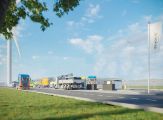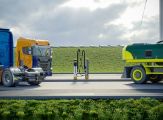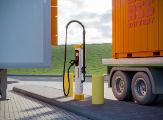Multidisciplinary pioneering: first fast-charging plaza for e-trucks
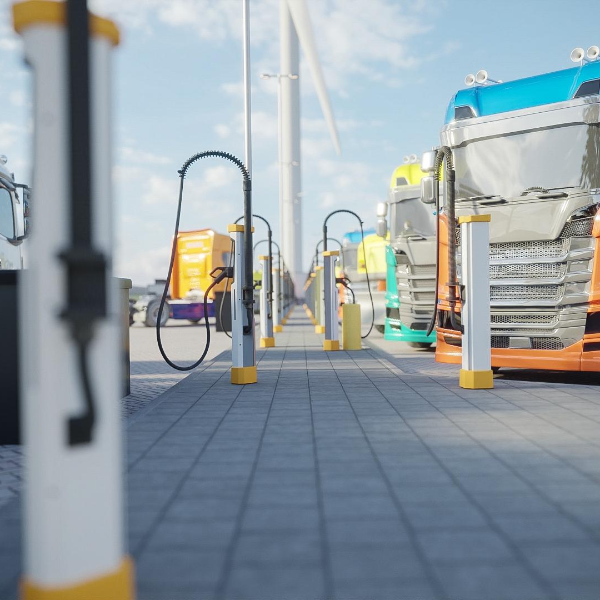
Multidisciplinary pioneering: first fast-charging plaza for e-trucks
The first fast-charging plaza in the Netherlands for trucks and heavy equipment, located alongside the A15 at Geldermalsen, will be operational in April 2023. The innovative project is an initiative of WattHub. In a pioneering role, Witteveen+Bos was responsible for the permit process and the safety risk analysis.
More and more transport companies are adding electric trucks to their fleets, and a Europe-wide agreement has stipulated that from 2040 all newly sold trucks must be electric. The demand for e-truck charging locations, therefore, is set to skyrocket. Against this background, the WattHub fast-charging plaza marks a new chapter in the energy transition in the Netherlands.
Permit process without precedent
Witteveen+Bos was asked by WattHub, an initiative of the contractors Van Oord, Dura Vermeer and Ploegam and the citizen-led wind energy cooperative Betuwewind, to contribute to the project. ‘This fast-charging plaza is the first in the Netherlands, meaning there’s no precedent for the permit process,’ explains environment and planning law specialist Justin Keizer.
‘The plaza spans several domains, including environmental legislation, industrial and environmental safety, and noise. Its location close to a waste treatment plant and next to a wind farm is also significant. In effect, we started putting a puzzle together without knowing what it would look like in the end. The existing legal framework was, of course, our starting point. The challenge was to see where a fast-charging plaza would fit within it – an interesting, pioneering process.’
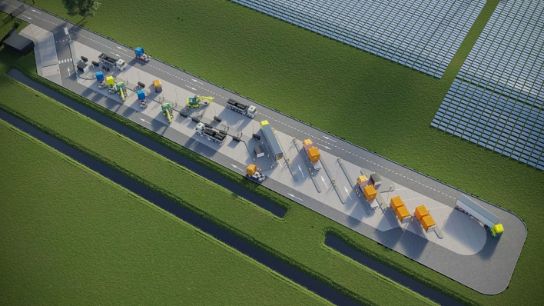
Multidisciplinary approach
In collaboration with the client and Omgevingsdienst Rivierenland, Veiligheidsregio Gelderland-Zuid, the West Betuwe Municipality and other stakeholders, we successfully completed the permit process – from application to approval – in four months. To ensure the best solution and a quick turnaround time, a multidisciplinary approach was adopted. Witteveen+Bos’s permit process specialists combined their expertise with our engineers experienced in the environment and health.
Justin: ‘This project will act as a model for future fast-charging plazas, so it’s especially important to lay down a solid, high-quality foundation.’ This foundation involves, among other things, permits and industrial and environmental safety. For the permit process, we first determined which categories of environmental legislation were applicable. The necessary permissions were then applied for and obtained, enabling WattHub to begin construction.
Translation of general regulations
In the field of industrial and environmental safety, regulations for lithium-based energy carriers are still being developed. Currently, these regulations and other guidelines are only formulated in general terms; translating them to the specific situation of a fast-charging plaza for heavy equipment had never been done. ‘Our engineers and safety consultants performed this translation. Key areas of concern included fire safety, emergency response, and the layout of the charging plaza in relation to various external factors. This led to measures specific to this fast-charging plaza, which were then incorporated into the design. In this way, a customised manner of ensuring industrial and environmental safety was achieved.’
Constructive collaboration among the stakeholders made a significant difference, resulting in a turnaround time of just four months. ‘The competent authority has been involved from the start. We prepared and shared several detailed memorandums. This created a fruitful collaboration that resulted in a well-supported application,’ concludes Justin Keizer.
WattHub: product of emission-free dyke reinforcement
WattHub has its origins in the Tiel-Waardenburg dyke reinforcement project, where the Mekante Diek construction consortium is conducting a virtually emission-free implementation. This constitutes a big step forward in reducing nitrogen emissions during construction projects. The contractors involved in Mekante Diek – Ploegam, Van Oord and Dura Vermeer – are also WattHub’s first major clients.
The ultra-modern charging plaza delivers a total capacity of 5 megawatts, with the possibility of increasing this to 10. The plaza has 39 charging poles, each one offering a maximum charging speed of 350 kW. Electric trucks and heavy equipment are able to fast-charge or change battery packs at the plaza. The WattHub charging plaza was realised near Solar farm AVRI (9.3 MWp) and Wind farm AVRI (10.8 MW) of Burgerwindcoöperatie West-Betuwe (Betuwewind) which will supply the charging plaza with locally generated renewable electricity.
More information?

